Graduate students make up about 10% of the student population across 57 graduate programs and 29 graduate certificates offered at South Dakota State University. Each graduate student is immersed in research and scholarship with the support of their advisor and the Graduate School staff.
April 1-5 is Graduate Student Appreciation Week, a great opportunity to highlight a few graduate students at SDSU and the work they are accomplishing.
Cierra Sazue, Alexis Barnes and James Okechukwu Kemeshi each have a unique story and path leading to SDSU. Their research, passions and goals are made possible with the academic and personal support offered at State.
From school counseling, to cover crops and precision agriculture technology, SDSU offers opportunities for students to achieve their goals both in and outside of the classroom.
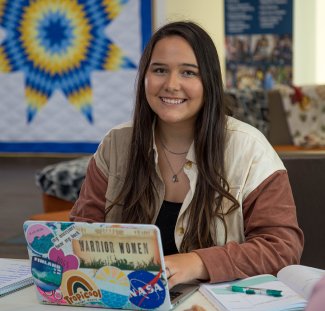
Cierra Sazue
Cierra Sazue graduated from SDSU in May 2023 with a Bachelor of Science in psychology, a Bachelor of Arts in American Indian and Indigenous studies and a minor in women, gender and sexuality studies. She is now pursuing a Master of Science in counseling with a specialty in school counseling.
Sazue grew up mostly in DeSmet and spent summers on the Crow Creek Reservation.
Her journey to SDSU started in the American Indian Student Center when a recruiter talked with Sazue and her mother about the opportunities available through the Wokini Initiative.
Sazue currently is the graduate student advisor to the American Indian Science and Engineering Society (AISES) chapter at SDSU. Additionally, she teaches two courses, Lakota 101 and 102.
Her drive to go into school counseling comes from her passion in helping others.
Some points of pride for Sazue from her time as an SDSU graduate student include helping the AISES chapter win the National Community Service Chapter of the Year award, becoming a Sequoyah fellow and sharing her passion for the Lakota language with students.
Sazue is also working with Nicole Lounsbery, director of the Graduate School, in supporting other American Indian graduate students through a Supporting American Indian Graduate Enrollment and Success (SAIGES) Wokini grant.
“We hope to both support our current graduate students through mentorship and community building as well as recruit more Indigenous students to our graduate school through outreach and networking,” Sazue said.
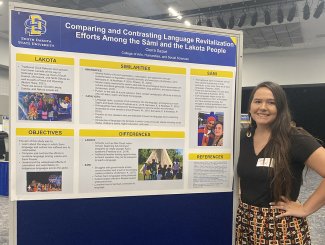
During her undergraduate education at SDSU, Sazue traveled to Finland and Norway through an education abroad experience. There, she analyzed the difference in health care for Native communities between South Dakota and these European countries.
Strong mentorship and opportunities with student organizations are both highlights of Sazue’s time at State.
“Something that surprised me about graduate school is the dedication that the staff and faculty have in my program to ensuring the success of each and every student,” Sazue said. “All of my professors and advisors are extremely helpful, knowledgeable and most importantly, kind.”
Sazue says anyone considering a graduate education at SDSU should go for it. While it may be challenging, it is also “engaging, useful and valuable.”
“SDSU does a great job at supporting graduate students and providing the assistance we need to grow and succeed,” Sazue said.
Alexis Barnes
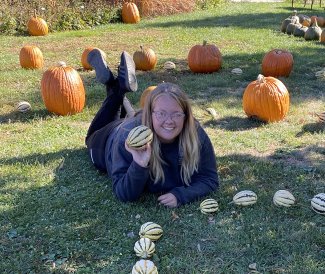
Alexis Barnes, originally from Chicago, graduated from Indiana State University with a Bachelor of Science in geography and sustainability. Now she is pursuing a Master of Science in plant science at SDSU under the direction of Kristine Lang.
She is a science communication fellow with the Portal to the Public and the National Science Foundation. Her research is focused on clover cover crops as a living mulch for broccoli, bell pepper and organic winter squash production.
“We are trying to look for natural alternatives to single-use plastic that can benefit South Dakota specialty crop producers with weed control, soil health and increasing labor costs,” Barnes said.
Barnes has already conducted her research for two field seasons and presented her findings at almost 50 speaking engagements in the past two years. Sharing her passion for research with farmers, Master Gardeners and researchers has been a highlight of her educational time at State.
“I did not know that South Dakota farmers and Master Gardeners would get so excited talking to grad students,” Barnes said.
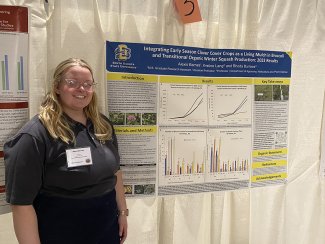
Barnes and her research were also featured in the February edition of Vegetable Grower News magazine.
She points to the experience and expertise of her advisor in the field of sustainable horticulture as a benefit of her graduate education. She sought to learn more about SDSU Extension and the combination of research and outreach in helping small producers.
Her goals beyond her graduate education include working in Extension or nonprofit organizations to advocate for local food accessibility and supporting small growers.
Barnes offered advice for current graduate students or anyone considering a graduate degree. “Graduate school is tough, but don’t forget about your hobbies. Doing the things you love can balance school stress.”
James Okechukwu Kemeshi
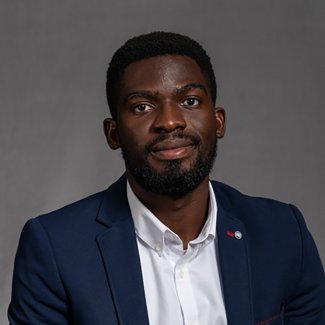
James Okechukwu Kemeshi comes to South Dakota State from Owerri, Nigeria, with a passion for agriculture and robotics and a desire to take his ideas to the next level. He is a doctoral candidate in agricultural and biosystems engineering.
His research focuses on the development of cost-effective unmanned ground vehicles designed to conduct weed and disease detection. As part of this project, he hopes to encourage small-scale farmers to “adopt the use of ground robots on the farms to achieve sustainable agriculture.”
Kemeshi hopes to join an agricultural robotics company to support sustainable agriculture and the betterment of society following his graduation.
He said through SDSU’s state-of-the-art facilities and supportive faculty who genuinely want their student to learn and excel, he was able to build a working prototype of his unmanned ground vehicle.
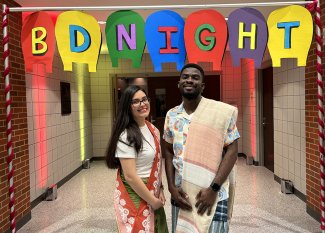
Back home, he developed an automated vegetable cutter. Through advice and conversations with his advisor, he took a development from his undergraduate studies in Nigeria and “dug deeper” into the topic.
SDSU captivated his interest primarily due to Young Chang's, assistant professor in the Department of Agricultural and Biosystems Engineering, extensive expertise in robotics and automation.
“His vision of developing unmanned ground vehicles to automate some farm practices was in line with my aspirations,” Kemeshi said.
A memory he won’t forget is his participation in the SDSU Graduate School 3-minute thesis competition, a “fun yet challenging experience,” where he placed as the first runner-up.
Kemeshi would encourage anyone to consider a graduate education at SDSU because of the facilities and support available to help reach your goals.
- Contact:
- Telephone number: 605-688-6161
Republishing
You may republish SDSU News Center articles for free, online or in print. Questions? Contact us at sdsu.news@sdstate.edu or 605-688-6161.

